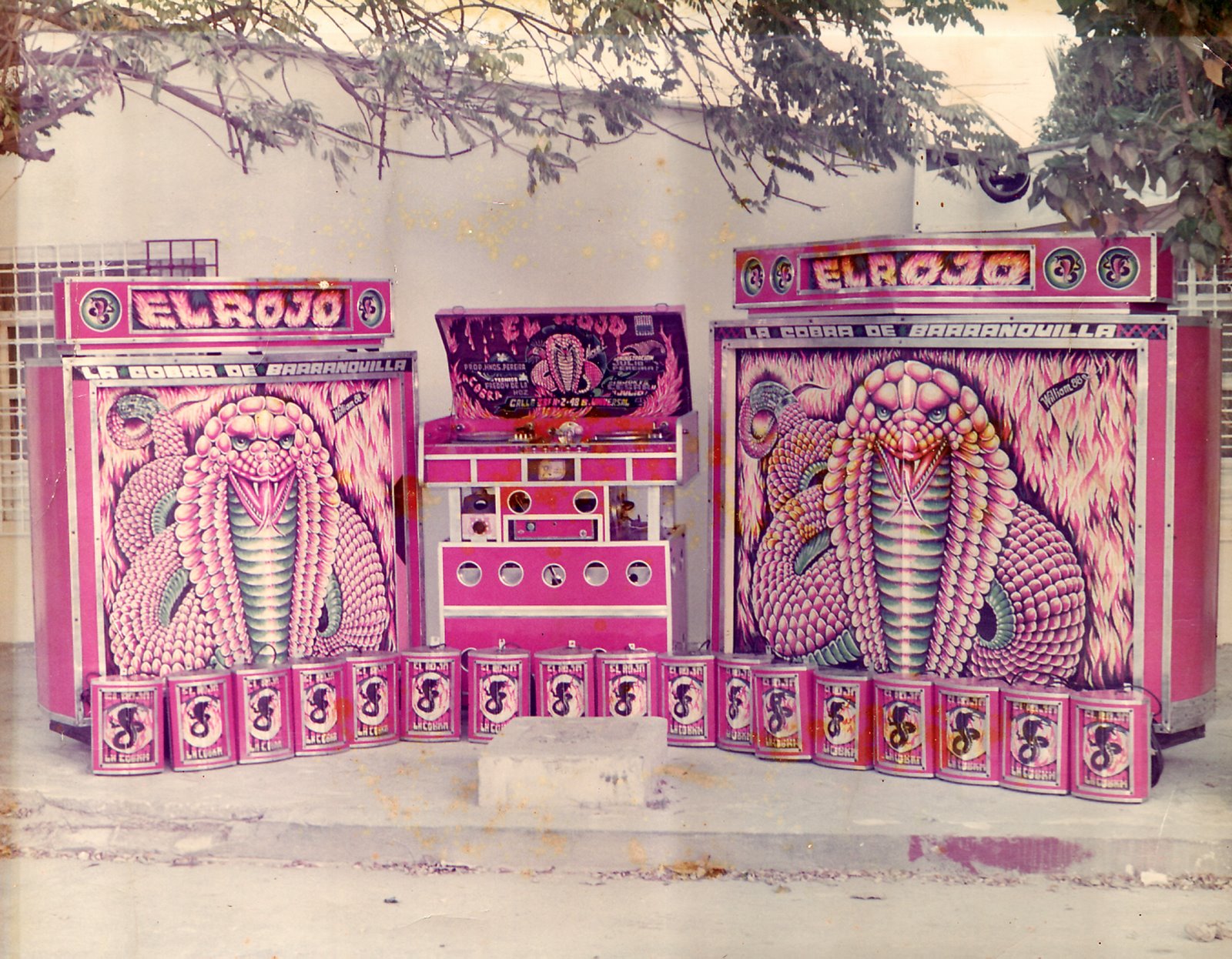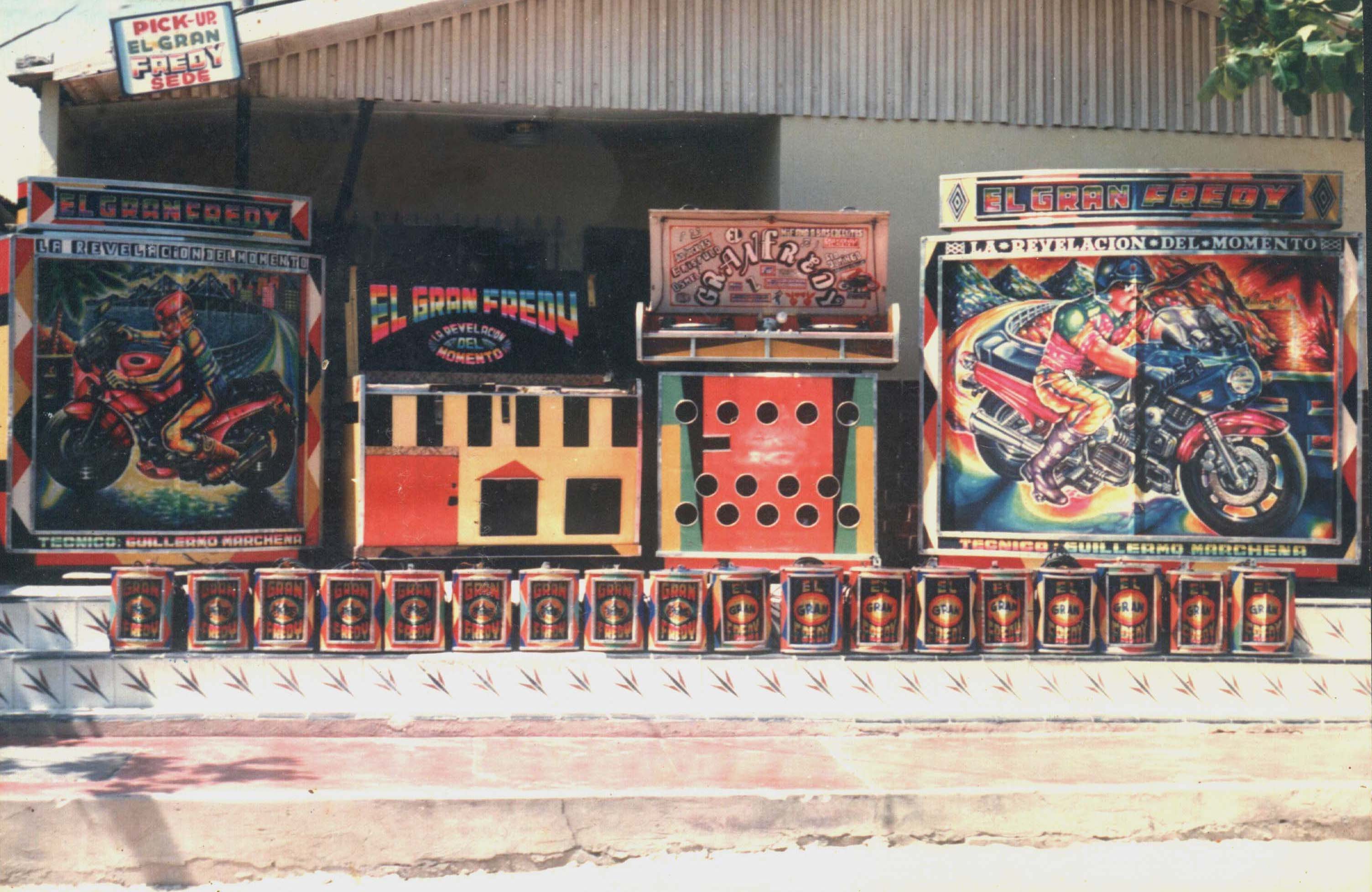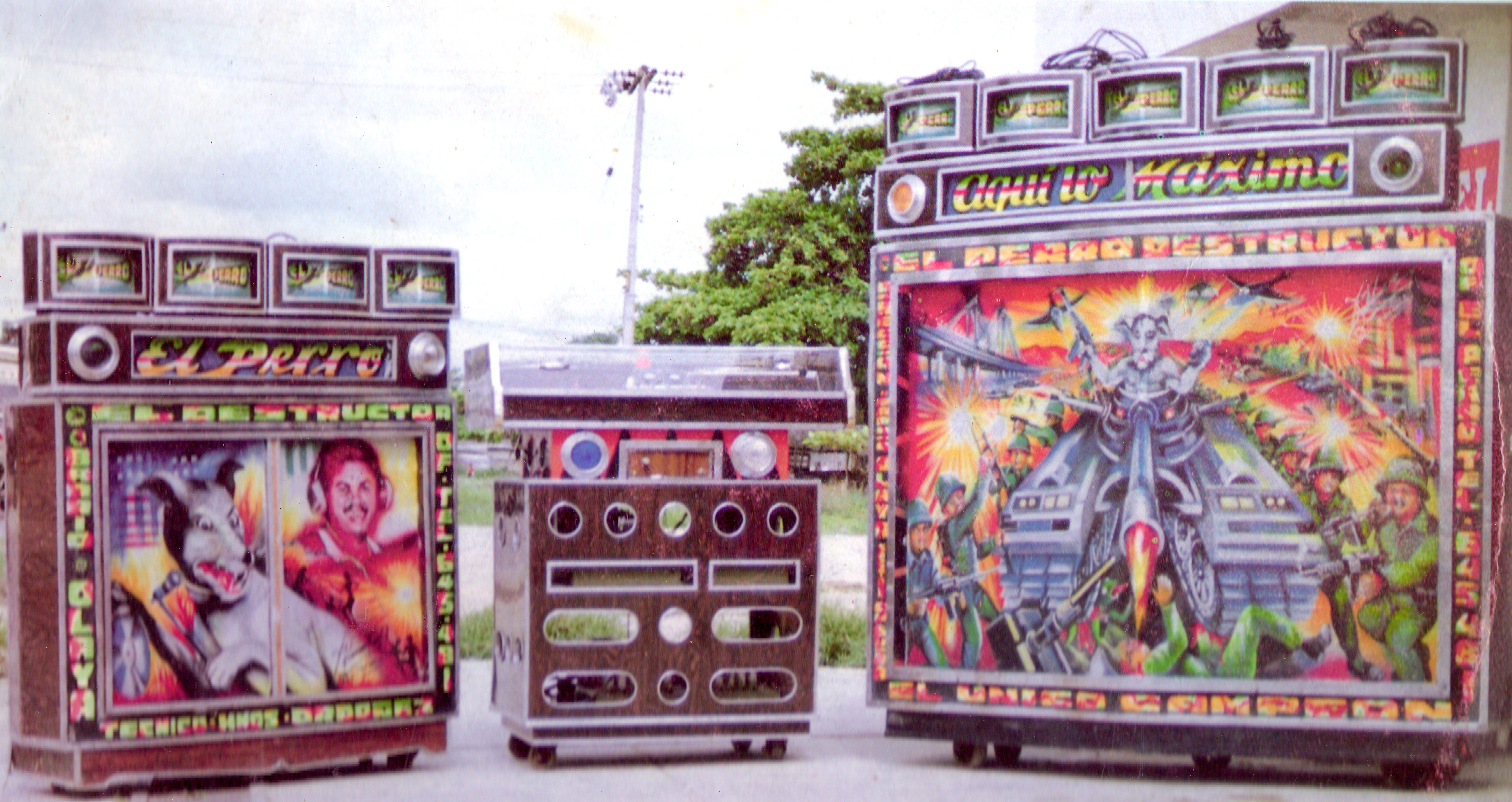


I came across this dream collection of picós pictures on Africolombia's blog. Picós are these huge, powerful, customized, hand painted, highly fetishized sound systems from the Colombian Carribean Coast (Barranquilla, Cartagena, Palenque de San Basilio...).
Surfing and digging for info about picós I landed on this page (which has a few nice pictures too) and on this interesting essay by Deborah Pacini Hernandez: "Sound Systems, World Beat, and Diasporan Identity in Cartagena, Colombia" (published in Diaspora. A Journal of Transnational Studies, Volume 5, Number 3, Winter 1996, University of Toronto Press). Although this paper has been written 14 years ago, describing a situation which since then has probably evolved (at least on the technological level I guess), it definitely still captivates. The author traces the fascinating cultural connection between this particular area of the country and Africa, a connection originating in the dark slavery days of the XVIIth century... and which among others lead - in the second half of the XXth century and particularly in the 70s - to the development of picós (i.e. local sound systems - the word picó deriving from the English pick up, referring either to the record player or to the truck transporting the whole thing) and champeta (the music played on these systems).
Pacini Hernandez not only traces back this cultural phenomenon but also focuses on the picós and picoteros technics and aesthetics - which paralleled the Jamaican developments on this field. These are among my favorite pages:


If the music originally played on these unreal sound systems came from all over Africa (vinyl records being brought to Colombia by sailors), champeta has a particular connection with Congolese soukous - as mentioned by Elisabeth Cunin in her more recent essay: "De Kinshasa à Cartagena, en passant par Paris : itinéraires d’une « musique noire », la champeta" (in Civilisations. Revue internationale d'anthropologie et de sciences humaines, Number 53, 2005, p. 97-117). So wait a minute: Colombian champeta originates in Congolese soukous, which derives from Cuban rumba (mixed with some Greek influence), rumba beats originating themselves from African music... Is that right? This continuous evolution based on travels and drifts across seas and through history makes the whole thing even more fascinating.
Picós played original versions of the songs but also covers by local Colombian bands and subsequent DJ mixes and remixes... Until today as picós are still pretty much a live reality that keeps on evolving all the time.
OK so now here comes the serious stuff (or more immediate food): the videos. Contemporary picós (or at least from just a few years ago) playing champeta. MCs toasting, street dancers moving while DJs spin soukous tunes. Rapid Casio SK5 keyboard drumpad fever on ecstatic congolese guitar solos. Dream music, heavy sound, serious street party vibes. Incredible mix. I think I played the first clip 100 times or something?!

(Drawing: Dairo Barriosnuevo)
Saludos a Magdalena!

primarily thanks for present on his blog the musical culture of the peaks of Colombia.
RépondreSupprimerThanks to these giant sound systems and the Radio, the music Afro (Salsa, Africa, regaee, Calypso, Cumbia..etc) will was diffused to all corners of the north coast of Colombia, music brought by many people, mostly by boats or ships coming to our shores.
I had the honor of welcoming to my humble home to many people around the world, last year I had the honor of receiving a large French journalist friend Yannis Ruel journals and Worldsound & Mondomix.
and a couple weeks is also visited by another great friend DJ, his name Mick Donohoe took him to see some and some record stores and also to find the picós (Sound Systems)
Best Regards,
Fabian Altahona Romero
Gracias Fabian por tu blog donde la conexión afro-sudamericana es tan patente y genial, y en particular por esta fantástica pagina sobre los picós ¡¡Estos picós son demasiado!! Espero ver más fotos en el futuro... Saludos cordiales desde Music City.
RépondreSupprimerReally nice article here on the sound systems and a nice extension of Fabian's blog, especially for anyone who can't read Spanish. I really can't help but find all this Afro-Colombian music intensely fascinating. It's really starting to take over my life!
RépondreSupprimeri will continue to submit more photos of "Los Picós" (sound systems) in the future and I thank you both for your interest in our culture picoteril. If it were not for Peaks I think songs like Lizandro Meza "El Shacalao" the Colombian version of "Shakara" by Fela Kuti had not existed, and many other versions of Haiti. the originals titles first became known in Colombia way through these, Los Picós - (Sound Systems) through them many African melodies were heard and then became more popular for local radio and labels "seals" Colombians as Felito Records, Machuca, Discos Fuentes and others, drew their versions de bandas Colombianas Afrosound, Wganda Kenya...etc
RépondreSupprimerfor me El Picó is a symbol as a bridge through which he passed the music of the world to our ears en Colombia
Welcome Russ,
Fabian-
Thanks for the comment Russ! And sorry for not answering before. Yes, these picos are too much! Massive!
RépondreSupprimerRegards DJ Bongo Man, Dairo Barriosnuevo communicates, in past days I got into the computer of a friend named Magdalena, where I made a comment in one of the videos on youtube that was apparently posted by you, but the comment came the name of this friend, my concern was to let you know and be clear about this, on the other hand, the picture you posted of the play "The Timbalero" is of my authorship, that's all, thanks
RépondreSupprimerhttp://fukafra.blogspot.com.co/2015/09/el-recreativo-arte-de-ser-un-picotero.html
RépondreSupprimerhttp://fukafra.blogspot.com.co/2015/09/el-recreativo-arte-de-ser-un-picotero.html
RépondreSupprimer